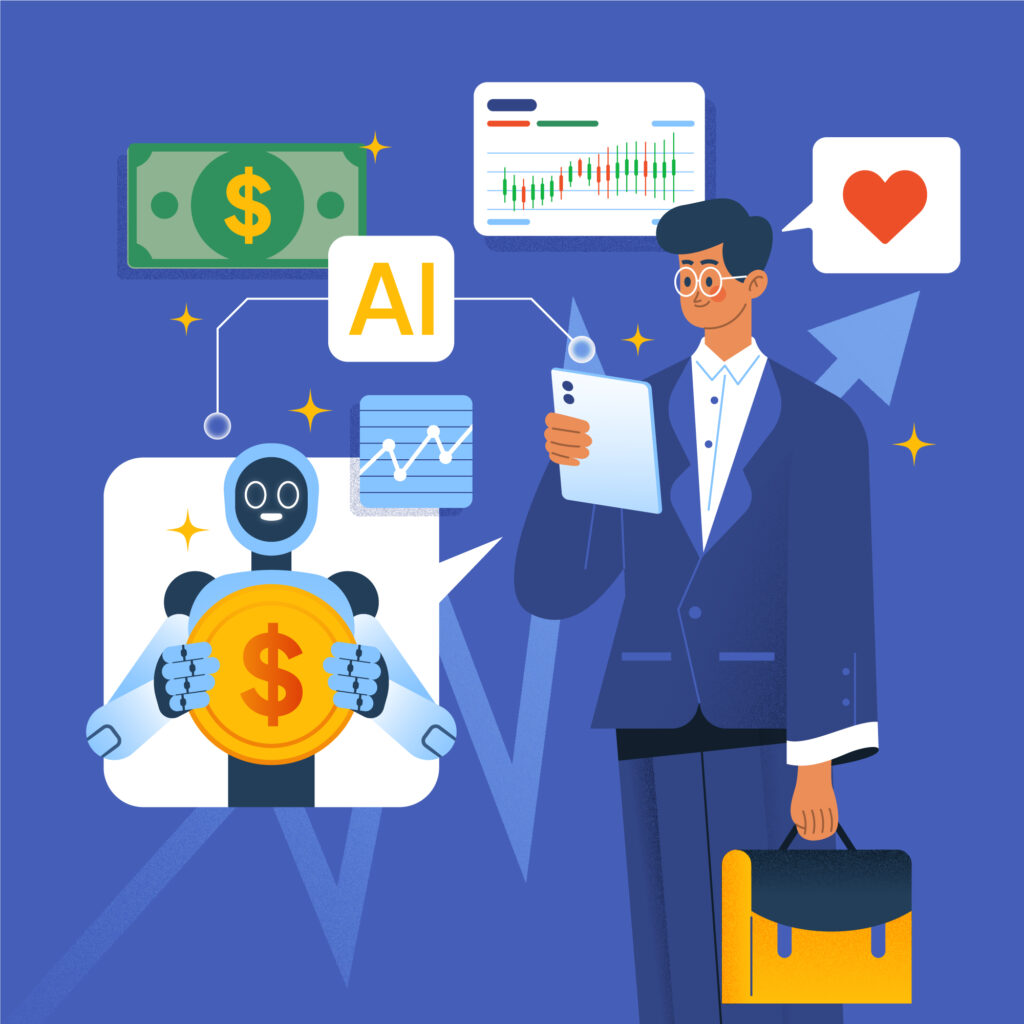Artificial Intelligence has transformed the financial world with innovations that are redefining how global markets operate. Among these innovations, AI trading agents have gained immense attention for their ability to analyze complex market data, predict trends, and execute trades autonomously. These intelligent systems have created new opportunities for investors and institutions while also raising critical discussions about efficiency, ethics, and the future of finance.
This blog explores the growing influence of AI trading agents across global markets, how they are developed, their advantages and challenges, and the potential they hold for shaping the financial industry in the years to come.
Understanding What AI Trading Agents Are and How They Work
AI trading agents are intelligent software systems designed to make financial decisions by analyzing massive datasets. These agents utilize machine learning, deep learning, and data modeling techniques to identify patterns and execute trades based on predictions derived from real-time and historical data.
In essence, an AI trading agent acts like a digital trader that never sleeps. It processes data from multiple sources, such as stock prices, economic indicators, and global news. Using predictive algorithms, the system determines the best time to buy or sell assets to maximize profits or reduce risks.
The success of such systems relies heavily on AI Trading Agent Development, which involves combining financial domain knowledge with advanced AI technologies. Developers must create models capable of adapting to rapidly changing markets and adjusting strategies without human intervention.
The Evolution of AI in Global Financial Markets
AI technologies have steadily progressed in financial markets over the past two decades. Initially, algorithmic trading relied on simple rule-based systems that followed pre-set commands. Over time, the integration of machine learning allowed trading platforms to analyze unstructured data, such as news sentiment and social media trends, offering a more dynamic approach to decision-making.
Today, AI Trading Agent Development has evolved into a sophisticated field involving neural networks, reinforcement learning, and natural language processing. These tools allow AI systems to make complex trading decisions and even predict market shifts before they happen.
Financial institutions are now investing heavily in AI development services to create more accurate, efficient, and scalable trading systems. This evolution highlights a major shift in how technology is redefining investment strategies and market structures across the globe.
Benefits of Using AI Trading Agents in Global Markets
AI trading agents offer a range of benefits that are revolutionizing global financial systems. Some of the most significant advantages include:
- Speed and Efficiency
AI trading agents can analyze and execute trades within milliseconds. This speed enables investors to capitalize on opportunities that human traders might miss due to slower decision-making processes. - Data-Driven Decision-Making
These systems can process vast amounts of information from diverse data sources, allowing for more accurate and informed trading decisions. - Emotion-Free Trading
Human emotions such as fear or greed can lead to poor financial decisions. AI trading agents, however, operate purely on data and algorithms, ensuring objective outcomes. - Continuous Operation
Unlike human traders, AI systems work 24 hours a day, constantly monitoring global markets and executing trades whenever opportunities arise. - Scalability
AI agents can manage multiple portfolios and diverse assets simultaneously, allowing large-scale trading operations across international markets.
The combination of these factors is transforming the global trading environment into one that is faster, more data-driven, and more efficient than ever before.
Challenges and Limitations of AI Trading Systems
While the benefits of AI trading agents are clear, there are also several challenges that must be addressed to ensure sustainable growth and reliability in financial markets.
- Data Quality Issues
AI systems depend on data accuracy. Poor-quality or incomplete data can lead to inaccurate predictions and financial losses. - Model Transparency
Many AI models operate as “black boxes,” making it difficult to understand how they arrive at specific trading decisions. This lack of transparency can create trust issues for investors and regulators. - Market Manipulation Risks
Highly advanced AI systems could unintentionally influence market prices, leading to instability or artificial volatility. - Regulatory Concerns
Governments and financial authorities are still developing regulations for AI-driven trading, making compliance a challenge for firms adopting such systems. - System Failures and Bias
Even the most advanced algorithms can make mistakes if they are not properly monitored or updated. Bias in training data can also result in flawed decision-making processes.
Despite these challenges, developers are working continuously to improve AI model transparency, accuracy, and reliability.
The Role of AI Trading Agent Development in Financial Innovation
AI Trading Agent Development plays a critical role in advancing financial innovation. This process goes beyond simply building algorithms—it involves understanding market behavior, optimizing trading strategies, and ensuring system adaptability.
Developers must integrate various components such as predictive analytics, neural networks, and natural language processing to create intelligent agents that can operate effectively in volatile market conditions. Testing and simulation are essential to ensure that the agents can handle diverse scenarios without compromising performance.
Many financial firms now choose to hire AI developers with expertise in data science and quantitative finance to enhance their in-house trading systems. These experts help organizations implement AI solutions that can learn from experience, adapt to market trends, and deliver better investment outcomes.
The Global Economic Impact of AI Trading Agents
AI trading agents have already begun to reshape the global economic landscape. Their growing influence is visible in how financial institutions manage assets, evaluate risks, and optimize trading performance.
- Enhanced Market Liquidity
Automated systems have increased liquidity by enabling rapid buying and selling of assets, leading to more stable and accessible markets. - Increased Market Participation
AI technology allows smaller investors and fintech startups to compete with large institutions through affordable automation solutions. - Shift in Employment and Skills
As AI systems take over repetitive trading tasks, there is an increasing demand for professionals with expertise in AI, data analysis, and quantitative modeling. - Global Market Integration
AI systems enable trading across multiple time zones and markets, fostering greater global financial connectivity.
Through AI stock trading software development, companies are creating specialized tools that help investors manage risks, predict market trends, and improve their overall financial performance. This has made global markets more efficient but also more interdependent.
Ethical and Regulatory Considerations in AI Trading
The rise of AI trading agents brings forth important ethical and regulatory concerns that must be addressed to ensure fairness and transparency in financial systems.
- Fair Competition
AI-powered firms with advanced algorithms could dominate markets, leading to an uneven playing field. Regulators must ensure that all participants have equal opportunities. - Data Privacy and Security
Since AI agents rely heavily on data, protecting sensitive financial information is critical to prevent misuse or breaches. - Algorithm Accountability
It is essential to define clear accountability structures for AI-driven decisions, especially when errors result in significant financial consequences. - Regulatory Adaptation
Governments around the world are now working to update financial laws and create standards for AI systems. Regulations must balance innovation with consumer protection.
Organizations specializing in AI agent development are increasingly incorporating ethical design principles, ensuring that AI systems comply with both regulatory frameworks and moral standards.
Future Prospects of AI Trading in Global Markets
The future of AI trading agents looks promising, with emerging technologies likely to expand their capabilities and influence. As research in AI continues to advance, we can expect trading agents to become even more intelligent, adaptive, and integrated into global finance.
- Integration with Quantum Computing
Quantum technologies could allow AI agents to process data exponentially faster, enabling near-instant market analysis and trading execution. - Improved Predictive Models
Future AI systems will combine economic, social, and geopolitical data to make more accurate forecasts and investment recommendations. - Decentralized Trading Systems
The rise of blockchain and decentralized finance (DeFi) could merge with AI trading, offering more transparent and autonomous financial ecosystems. - Human-AI Collaboration
Instead of replacing human traders, AI agents will increasingly act as decision-support tools, enhancing human judgment with data-driven insights. - Regulatory Innovation
Governments will likely introduce advanced frameworks that promote safe and ethical AI integration across global financial systems.
As these developments unfold, AI trading agents will continue to play a central role in transforming global markets into more efficient, transparent, and accessible systems.
Conclusion
The impact of AI trading agents in global markets is profound and far-reaching. They have redefined how financial institutions operate, enhanced decision-making processes, and created new opportunities for both investors and developers. However, this transformation also comes with challenges, including regulatory, ethical, and technological concerns that must be addressed responsibly.
As artificial intelligence continues to evolve, its role in trading will expand, driving further innovation across the financial sector. The future of global markets will likely be shaped by the balance between technological advancement and human oversight, ensuring that AI serves as a tool for progress rather than disruption.



